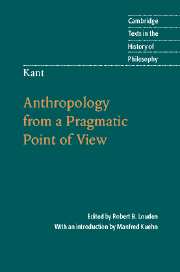Book contents
- Frontmatter
- Contents
- Introduction
- Chronology
- Further reading
- Note on the text and translation
- Anthropology from a Pragmatic Point of View
- Preface
- Contents
- Part I Anthropological Didactic. On the way of cognizing the interior as well as the exterior of the human being
- Book I On the cognitive faculty
- Book II The feeling of pleasure and displeasure
- Book III On the faculty of desire
- Part II Anthropological Characteristic. On the way of cognizing the interior of the human being from the exterior
- Index
- Cambridge Texts in the History of Philosophy
Book I - On the cognitive faculty
Published online by Cambridge University Press: 05 June 2012
- Frontmatter
- Contents
- Introduction
- Chronology
- Further reading
- Note on the text and translation
- Anthropology from a Pragmatic Point of View
- Preface
- Contents
- Part I Anthropological Didactic. On the way of cognizing the interior as well as the exterior of the human being
- Book I On the cognitive faculty
- Book II The feeling of pleasure and displeasure
- Book III On the faculty of desire
- Part II Anthropological Characteristic. On the way of cognizing the interior of the human being from the exterior
- Index
- Cambridge Texts in the History of Philosophy
Summary
On consciousness of oneself
The fact that the human being can have the “I” in his representations raises him infinitely above all other living beings on earth. Because of this he is a person, and by virtue of the unity of consciousness through all changes that happen to him, one and the same person – i.e., through rank and dignity an entirely different being from things, such as irrational animals, with which one can do as one likes. This holds even when he cannot yet say “I,” because he still has it in thoughts, just as all languages must think it when they speak in the first person, even if they do not have a special word to express this concept of “I.” For this faculty (namely to think) is understanding.
But it is noteworthy that the child who can already speak fairly fluently nevertheless first begins to talk by means of “I” fairly late (perhaps a year later); in the meantime speaking of himself in the third person (Karl wants to eat, to walk, etc.). When he starts to speak by means of “I” a light seems to dawn on him, as it were, and from that day on he never again returns to his former way of speaking. – Before he merely felt himself; now he thinks himself. – The explanation of this phenomenon might be rather difficult for the anthropologist.
- Type
- Chapter
- Information
- Kant: Anthropology from a Pragmatic Point of View , pp. 15 - 124Publisher: Cambridge University PressPrint publication year: 2006



